- Home
- Nicholas Sparks
The Wish Page 13
The Wish Read online
Page 13
Alone with my thoughts, I tried to picture what my parents were doing. Or would be doing later, because it was still early there. I wondered whether Morgan would be practicing the violin—she did that a lot on Saturdays—or whether she’d go shopping at the mall for gifts. I wondered if they’d gotten the tree yet or if that was something they would do later today or tomorrow or even next weekend. I wondered what Madison and Jodie were up to, whether either of them had met a new guy, what movies they’d gone to see lately, or where—if anywhere—they were going for the holidays.
Yet, for the first time since I’d left Seattle, the thoughts didn’t make me ache with a sadness that felt overwhelming. Instead, I realized that it had been the right decision to come here. Don’t get me wrong—I still wished none of this had ever happened—but somehow I knew that my aunt Linda was exactly what I needed at this time in my life. She seemed to understand me in a way that my parents never had.
Maybe because, just like me, she always felt alone.
* * *
After I returned to the house, I showered and stuffed the things I would need for church in one of the duffel bags I’d brought from Seattle, then spent the rest of the day reading various chapters in my textbooks, still trying to catch up and hoping that some of the information would stick in my head long enough for me to be able to complete the homework without having to do the extra problems that Bryce would no doubt concoct.
Aunt Linda returned at two—Saturdays were shorter days at the shop—and made sure that I’d packed everything else I needed but had forgotten, from toothpaste to shampoo. Afterward, I helped her set up the nativity scene on the fireplace mantel. As we worked, I noticed for the first time that her eyes were the same as my dad’s.
“What are your plans tonight?” I asked. “Since you’ll have the place to yourself?”
“Gwen and I are going to have dinner,” she said. “We’ll play gin rummy afterwards.”
“That sounds relaxing.”
“I’m sure you’ll have a pleasant evening with Bryce and his family as well.”
“It’s no big deal.”
“We’ll see.” The way she said it while also averting her eyes made my next question automatic.
“Do you not want me to go?”
“You two have spent a lot of time together already this week.”
“Tutoring,” I said. “Because you thought I needed it.”
“I know,” she said. “And while I agreed that you could go, I do have concerns.”
“Why?”
She adjusted the figurines of Mary and Joseph before answering. “It’s sometimes easy for young people to…lose themselves in feelings of the heart.”
The words she’d used—both old-fashioned and nunlike—took me a few seconds to process, but I felt my eyes widen. “You think I’m going to fall for him?”
When she didn’t answer, I almost laughed. “You don’t have to worry about that,” I went on. “I’m pregnant, remember? I have no interest in him at all.”
She sighed. “I wasn’t worried about you.”
* * *
Bryce showed up a few minutes after we’d finished decorating the mantel. Still a bit off-balance from my aunt’s comment but kissing her on the cheek anyway, I stepped out the door with my duffel bag while he was still ascending the steps.
“Hey there,” he said. Like me, he was dressed for a wintry night. The cool olive jacket had been replaced by a thick down coat like my own. “You ready? Can I take that for you?”
“It’s not heavy, but sure.”
After he grabbed the duffel, we waved goodbye to my aunt and made for his truck, the same one I’d seen on the ferry. Up close, it was bigger and taller than I remembered. He opened the passenger door for me, but it felt a bit like I was scaling a small mountain before I could finally crawl inside. He closed the door behind me and then got in from the other side, setting the duffel between us. Though the sky was clear, the temperature was already dropping. From the corner of my eye, I could see my aunt turn on the lights of the Christmas tree, which shone in the window, and for whatever reason, I suddenly thought back to the moment I’d first seen him and his dog on the ferry.
“I forgot to ask but is Daisy coming with us?”
Bryce shook his head. “No. I just dropped her off at my grandparents.”
“They didn’t want to come? Your grandparents, I mean?”
“They don’t like leaving the island unless they have to.” He smiled. “And by the way, my parents can’t wait to meet you.”
“Me too,” I said, hoping they wouldn’t ask the question, but I didn’t have time to dwell on it. The ride only took a few minutes; their house was in the same general area as my aunt’s shop, near the hotels and the ferry. Bryce pulled the truck into the drive, stopping next to a large white van, and I found myself peering at a home that initially struck me as the same as every other home in the village, except maybe a little larger and better maintained. As I was taking it in, the front door suddenly flew open and two young boys raced down the steps, jostling each other. I found my eyes flashing between them, thinking they were mirror images of each other.
“Richard and Robert, if you’ve forgotten,” he said.
“I’ll never be able to tell them apart.”
“They’re used to it. And they’ll mess with you because of it.”
“Mess with me how?”
“Robert’s in the red jacket. Richard is in the blue jacket. For now, anyway. But they might switch, so be prepared. Just remember that Richard has a tiny mole below his left eye.”
By then, the two of them had stopped near Bryce’s truck and were staring at us. Bryce grabbed my duffel and opened his door before climbing down. I did the same, feeling like I was falling before my feet finally hit the gravel. We met at the front of the truck.
“Richard, Robert?” Bryce said. “This is Maggie.”
“Hi, Maggie,” they said in unison, their voices sounding both robotic and forced, machine-generated. Then, also in unison, they both tilted their heads to the left and when they went on, I knew it was an act. “It is a pleasure to meet you and to have the honor of your company this evening.”
Playing along, I gave the Star Trek salute. “Live long and prosper.”
They both giggled, and even though they were standing close and it was daytime, I couldn’t detect the mole. But (blue jacket) Richard leaned into (red jacket) Robert, who pushed Richard, who then punched Robert, and after that, Robert was chasing Richard, finally vanishing behind the house.
From the corner of my eye, I saw movement to my right, at ground level beneath the house. When I turned, I saw a youngish-looking woman in a wheelchair emerge, followed by a tall man with a crew cut who I assumed was Bryce’s father.
I’d seen people in wheelchairs, of course. There was a girl named Audrey in my third and fourth grade classes who was in a wheelchair, and Mr. Petrie—like my dad, a deacon at the church—used one, too. But I hadn’t expected his mom to be in one, if only because Bryce hadn’t said anything about it. He could mention that she’d been a pregnant teen but forget to tell me this?
Somehow, I was able to keep my expression friendly but neutral. The two of them approached as his mom called out, “R and R…in the van! Or we’ll leave without you!”
Seconds later, the brothers came roaring around the opposite side of the house from where I’d last seen them. Now (blue jacket) Richard was chasing (red jacket) Robert…
Or were they messing with me?
There was no way to tell.
“In the van!” Bryce’s dad shouted, and circling it once, the twins opened the side door and jumped inside, the van bouncing slightly.
Smart or not, they definitely had energy.
By then, Bryce’s parents had drawn closer and I could see the welcome on their faces. His mom’s jacket was even puffier than mine, and her auburn hair was offset by green eyes. His father, I noticed, stood ramrod straight, his black hair threaded with sil
ver near his ears. Bryce’s mom held out her hand.
“Hi, Maggie,” she said with an easy grin. “I’m Janet Trickett, and this is my husband, Porter. I’m so glad you can join us.”
“Hi, Mr. and Mrs. Trickett,” I said. “Thanks for having me.”
I shook Porter’s hand as well. “Pleasure,” he added. “It’s nice to see a new face around here. I hear you’re staying with your aunt Linda.”
“For a few months,” I said. Then, “Bryce has really been helpful with my studies.”
“That’s good to know,” Porter said. “Are you both ready to go?”
“We are,” Bryce said. “Is there anything still in the house that I need to grab?”
“I’ve already loaded the bags. We should probably head out, since you never know how crowded the ferry will be.”
As I was about to head to the van, Bryce gently took hold of my arm, signaling for me to wait. I watched as his parents made their way to the side opposite the door his brothers had used. His father reached inside and I heard the hum of hydraulics and watched a small platform extend from the van, then lower to the ground.
“I helped my dad and grandfather modify the van,” he said, “so that my mom can drive it, too.”
“Why didn’t you just buy one?”
“They’re expensive,” he said. “And they didn’t have a model that would work for us. My parents wanted one where either of them could drive, so the front seat had to be easily interchangeable. It basically slides from one side to the other, then locks down.”
“The three of you figured that out?”
“My dad’s pretty smart about those kinds of things.”
“What did he do in the army?”
“Intelligence,” he answered. “But he’s also a genius with anything mechanical.”
Why was I not surprised?
By then, Bryce’s mom had vanished into the interior and the platform was rising again. Bryce took it as his cue to start walking. Opening the door on the opposite side, we got in, squeezing in beside the twins in the back seat.
After the van backed out, we started toward the ferry and I eyed the twin next to me. He was wearing a blue jacket, and peering closely, I thought I could see the mole. “You’re Richard, right?”
“And you’re Maggie.”
“Are you the one into computers or aeronautical engineering?”
“Computers. Engineering is for geeks.”
“Better than being a nerd,” Robert added quickly. He leaned forward in his seat, turning his head to peer at me.
“What?” I finally asked him.
“You don’t look sixteen,” he said. “You look older.”
I wasn’t sure whether it was a compliment or not. “Thanks?” I offered.
His expression was steady on mine. “Why did you move here?”
“Personal reasons.”
“Do you like ultralights?”
“Excuse me?”
“They’re small, slow, very light planes that only need a short runway to land. I’m building one in the backyard. Like the Wright brothers did.”
Richard cut in: “I make video games.”
I turned toward him. “I’m not sure what you mean.”
“A video game uses electronically manipulated images on a computer or other display device that allow a user to engage in quests, missions, or journeys, perform duties, or perform other tasks, either alone or with others as part of a competition or as a team.”
“I know what a video game is. I didn’t know what you meant by make.”
“It means,” Bryce said, “that he conceives games, writes the code, and then designs them. And I’m sure she’ll want to hear all about it—and the plane—later, but how about the two of you let us ride to the ferry in peace?”
“Why?” Richard asked. “I’m just trying to talk to her.”
“Richard! Let it be!” I heard Mr. Trickett call out.
“Your father’s right,” Mrs. Trickett added, glaring at them over her shoulder as well. “And you need to apologize.”
“For what?”
“For being rude.”
“How am I being rude?”
“I’m not debating with you,” she said. “Apologize. Both of you.”
Robert piped up. “Why do I have to apologize?”
“Because,” his mom answered, “you were both showing off. And I’m not going to ask you again.”
From the corner of my eye, I noticed both of them sink lower in their seats. “Sorry,” they said in unison. Bryce leaned closer, his breath warm on my ear as he spoke. “I tried to warn you.”
I stifled a giggle, thinking, And I thought my family was weird.
* * *
We waited in a longish line of cars for the ferry, but there was plenty of room on the deck, and we departed on schedule. Richard and Robert scrambled out of the van almost immediately, and we followed, watching as they raced toward the railing. Behind us, as I put on my hat and gloves, I heard the hydraulic lift. I gestured toward the upper enclosed seating area.
“Will your mom be able to go inside? I mean, is there an elevator?”
“Usually they spend most of the time in the van,” Bryce answered. “But she enjoys the fresh air for a little while. Would you like to get a soda?”
I saw the crowd moving in that direction and shook my head. “Let’s go up front for a while.”
We walked toward the bow along with a few other people, but were able to find a place where we weren’t sandwiched next to others. Despite the chilly air, the water was calm in all directions.
“Is Robert really building an airplane?” I asked.
“He’s been working on it for almost a year now. My father helps, but it’s his design.”
“And your parents will let him fly it?”
“He’d need his pilot’s license first. He’s mainly doing it as an entry into some national student science competition, and knowing him, I’m sure it will fly. My dad will make sure it’s safe, though.”
“Your dad can fly, too?”
“He can do a lot of things.”
“But your mom homeschools? Not your dad?”
“He always worked.”
“How can your mom possibly teach any of you anything?”
“She’s pretty smart, too.” He shrugged. “She started at MIT when she was sixteen.”
Then how did she become pregnant as a teenager? I wondered. Oh, yeah. Sometimes it’s just an oops. But still…what a family. I’d never even heard of another one like it.
“How did your parents meet?”
“They were both interning in Washington, D.C., but I don’t know much more than that. They don’t really share those kinds of stories with us.”
“Was your mom in a wheelchair then? I’m sorry, I know I probably shouldn’t ask…”
“It’s okay. I’m sure a lot of people wonder about it. She was in a car accident eight years ago. Two-lane highway, a car passing another car from the opposite direction. To avoid a head-on crash, my mom veered off the road, but she hit a telephone pole. She almost died; it’s actually kind of a wonder that she didn’t. She spent almost two weeks in the ICU, had multiple surgeries and a ton of rehab. But her spinal cord was damaged. She was fully paralyzed from the waist down for over a year, but eventually she recovered some feeling in her legs. Now she can move them a little—enough to make dressing easier—but that’s it. She can’t stand.”
“That’s awful.”
“It’s sad. Before the accident, she was very active. Played tennis, jogged every day. But she doesn’t complain.”
“Why didn’t you tell me about her?”
“I guess I didn’t think about it. I know that sounds strange, but I don’t really notice it anymore. She still teaches the twins, makes dinner, goes shopping, takes photographs, whatever. But you’re right. I should have thought to mention it.”
“Is that why your family moved to Ocracoke? So her parents could help out?”
“It’s actually the opposite. Like I told you, after my dad retired from the military and started consulting, we could have gone anywhere, but my grandmother had had a stroke the year before. Not a bad one, but the doctor indicated that she might have more in the future. As for my grandfather, his arthritis is getting worse, which is another reason why my dad helps him whenever he’s in town. The point is, my mom thought she could help her parents more than they could help her, so she wanted to live near them. Believe it or not, she’s fairly independent.”
“And she’s the reason you’re raising Daisy? To help someone like your mom who needs it?”
“That was part of it. My dad also thought I’d enjoy having a dog for a while since he travels so much.”
“How much does he travel?”
“It varies, but it’s usually four or five months a year. He’ll be taking off again sometime after the holidays. But now it’s your turn. We’ve been talking about me and my family and it feels like I don’t know anything about you.”
I could feel the wind in my hair, could taste the salt in the chilly air.
“I’ve told you about my parents and my sister.”
“What about you, then? What else do you like to do? Do you have any hobbies?”
“I used to dance when I was little, and I played sports in middle school. But no real hobbies.”
“What do you do after school or on the weekends?”
“Hang out with my friends, talk on the phone, watch TV.” Even as I said it, I understood how lame that sounded and knew I needed to get off the subject of me as quickly as possible. “You forgot to bring your camera.”
“For the flotilla, you mean? I thought about it, but I figured it would be a waste of time. I tried last year, and I couldn’t get the photos to turn out right. The colored lights all came out white.”
“Did you try using the automatic setting?”

 The Notebook
The Notebook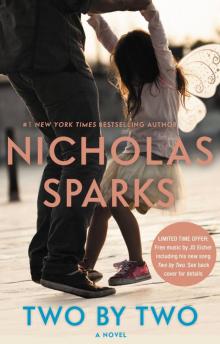 Two by Two
Two by Two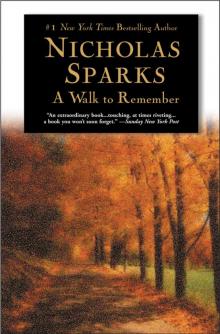 A Walk to Remember
A Walk to Remember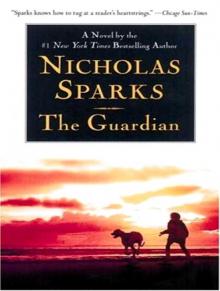 The Guardian
The Guardian Dear John
Dear John The Last Song
The Last Song The Lucky One
The Lucky One The Wedding
The Wedding The Longest Ride
The Longest Ride Safe Haven
Safe Haven The Rescue
The Rescue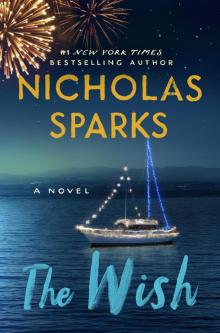 The Wish
The Wish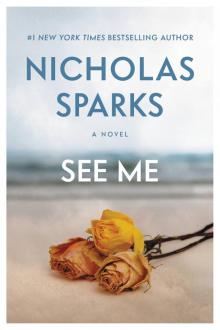 See Me
See Me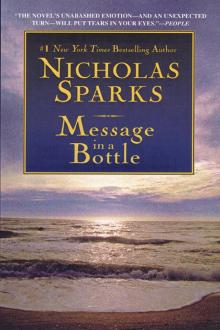 Message in a Bottle
Message in a Bottle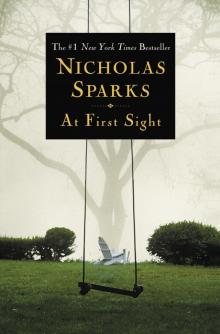 At First Sight
At First Sight True Believer
True Believer The Return
The Return A Bend in the Road
A Bend in the Road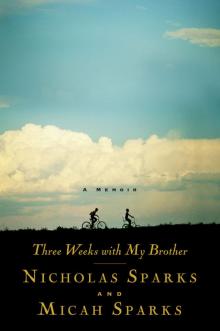 Three Weeks With My Brother
Three Weeks With My Brother Nights in Rodanthe
Nights in Rodanthe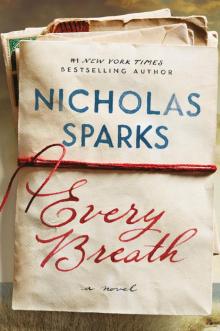 Every Breath
Every Breath